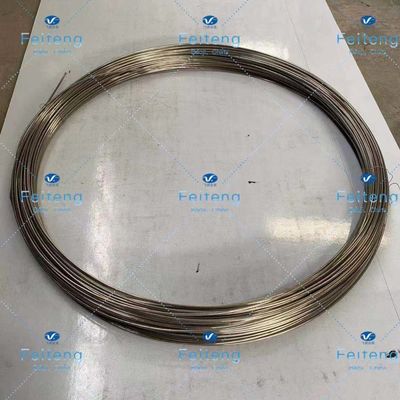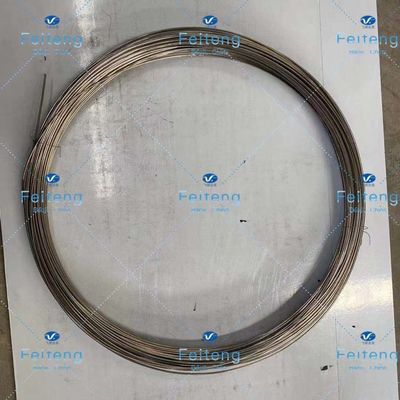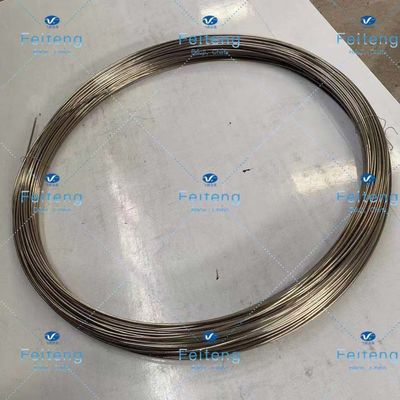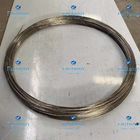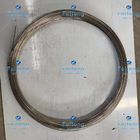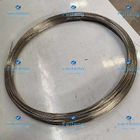Customized Grade 1 Dia 3.0mm Titanium Coil Wire
| Place of Origin | Baoji, Shaanxi, China |
|---|---|
| Brand Name | Feiteng |
| Certification | GB/T19001-2016 idt ISO9001:2015 GJB9001C-2017 |
| Model Number | Titanium Wire |
| Minimum Order Quantity | To be negotiated |
| Price | To be negotiated |
| Packaging Details | Wooden case |
| Delivery Time | To be negotiated |
| Payment Terms | T/T |
| Supply Ability | To be negotiated |
| Certifaction | GB/T19001-2016 Idt ISO9001:2015 GJB9001C-2017 | Orgin | Baoji, Shaanxi, China |
|---|---|---|---|
| Packaging | Wooden Case | Model | Gr1 |
| Size | φ3.0*L | Item Name | Titanium Wire |
| Customized | Customized | ||
| Highlight | Gr1 Dia 3.0mm Titanium Coil Wire,Grade 1 Titanium Coil Wire,Customized titanium flat wire |
||
Titanium Wire Gr1 φ3.0*L Titanium Alloy Wire Titanium Welding Wire Titanium Coil Wire
| Name |
Titanium Wire |
| Grade | Gr1 |
| Connection | Wire |
| Port of delivery |
Xi'an port, Beijing port, Shanghai port, Guangzhou port, Shenzhen port |
Titanium has a metallic luster and ductility. Titanium is characterized by its low density, high mechanical strength and ease of processing. The plasticity of titanium depends largely on its purity. The purer the titanium, the more plastic it is. Good corrosion resistance, not affected by the atmosphere and seawater. At room temperature, it will not be corroded by hydrochloric acid below 7%, sulfuric acid below 5%, nitric acid, aqua regia or dilute alkali solution; Only hydrofluoric acid, concentrated hydrochloric acid, concentrated sulfuric acid can act on it. The presence of impurities in titanium greatly affects its mechanical properties, especially the interstitial impurities (oxygen, nitrogen, carbon) can greatly improve the strength of titanium and significantly reduce its plasticity. The good mechanical properties of titanium as a structural material are achieved by strictly controlling the appropriate impurity content and adding alloying elements.
The properties of titanium are closely related to temperature, morphology and purity. Dense titanium is fairly stable in nature, but powder titanium can cause spontaneous combustion in air. The presence of impurities in titanium significantly affects the physical, chemical, mechanical properties and corrosion resistance of titanium. In particular, some interstitial impurities can distort the crystal lattice of titanium and affect various properties of titanium. At room temperature, the chemical activity of titanium is very small and can react with a few substances such as hydrofluoric acid, but when the temperature increases, the activity of titanium increases rapidly, especially at high temperature, titanium can react violently with many substances. The smelting process of titanium is generally carried out at a high temperature above 800℃, so it must be operated in a vacuum or under the protection of an inert atmosphere.
In contrast, a thin layer of titanium carbide may be formed when carburizing in charcoal under deoxidation or decarburization. The hardness of this layer is 32OUOMPa, which is consistent with the hardness of titanium carbide. The depth of the carburizing layer is roughly greater than that of the nit riding layer under the same conditions. Under the condition of oxygen enrichment, oxygen absorption must be taken into account to affect the hardening depth. Only at very thin layer thickness can the carbonized powder form sufficient adhesion strength in vacuum or argon methane atmosphere. In contrast, the gas carburizing agent may form a particularly hard and well-bonded titanium carbide hardened layer. At the same time, the hardening formed at temperatures between 950T: and 10201: is between 50fim and. With the increase of layer thickness, the titanium carbide layer becomes more brittle and tends to spell t to avoid carbon inclusion from the titanium carbide layer due to the decomposition of rethane, a specified dose of additive with a volume fraction of about 2% rethane should be used for gas carburizing in an inert gas. Low surface hardness results when methane is carburized with propane additives. When gas carburized propane was used under the bonding force of OkPa, the best wear resistance was achieved, although the thickness of hardened layer was measured to be very thin. Hydrogen is absorbed under the condition of gas carburizing agent, but it has to be removed again during vacuum annealing.
Main advantages
- Low Density and High Specification Strength
- Customer request customization
- Excellent Corrosion Resistance
- Good Resistance to Effect of Heat
- Excellent Bearing to Cryogenics Property
- Good Thermal Properties
- Low Modulus of Elasticity




